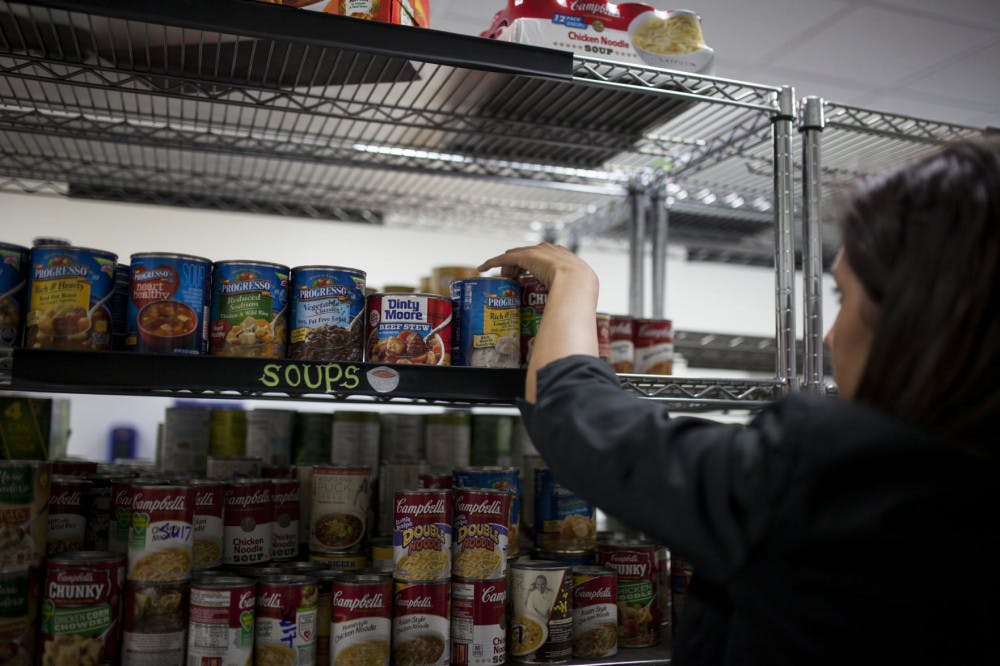
A volunteer stocking shelves with canned food at the Field and Fork Pantry on UF's campus in 2016.
The Hitchcock Field and Fork pantry can’t afford to close its doors like the rest of campus or else some in the UF community may go to bed hungry.
The UF Hitchcock Field and Fork pantry, which provides assistance to students experiencing food insecurity, has remained open throughout the entirety of the COVID-19 pandemic. The pantry created an online ordering system in late March to give students access to shop for groceries in the pantry, said Brittani Trimble, pantry operations coordinator.
In the U.S., one in six Americans don’t have access to proper amounts of healthy foods, including 21.4%of U.S. children, according to the University of North Florida Department of Nutrition & Dietetics Center for Nutrition and Food Security. In Florida, about 17%of adults and 26.7% of children are considered food insecure.
The online order form has a list of 16 food items, ranging from canned beans to macaroni and cheese, that Trimble deemed staple foods available in the pantry.
Produce from Field and Fork gardens, also located on campus, as well as fresh bread, are also available in the pantry.
“We have been open every week,” Trimble said. “And even the normal weeks that we maybe would have been closed in the past, we've been open.”
Students can order food online and pick it up at the pantry, located on Reitz lawn near McCarty Hall A. The pantry also has made preparations in case a student is, for any reason, unable to order online, with pre-made bags of food in the pantry that students can come at any time and grab.
The pantry is comparable to an online shopping experience similar to Publix, where shoppers can add items to an online cart, said Lindsey Danburg, Assistant Director of Administrative Services. Then, they can select a date and time to collect their groceries in the pantry.
“It's really much more convenient,” she said.
In the past, the pantry relied on volunteers for the day-to-day upkeep of the pantry, doling out tasks such as the labeling, sorting, and stocking of donated food items and toiletry products to those that signed up to help. Now, a revolving door of volunteers seems less viable during a pandemic.
Danburg said the decision to suspend the pantry volunteer program also led to a decision to increase the student staff by three or four people.
“It not only helps keep the pantry stocked and keeps things running, but it also helps additional students to be able to earn income,” she said.
Field and Fork made similar adjustments to the way its on campus gardens are staffed.
Field and Fork Program Coordinator Dina Liebowitz addressed the safety concerns that the program was concerned about. Without volunteers this semester, the intern program was expanded to ten undergraduate and two graduate interns.
“Having volunteers flowing through the garden was not going to meet the safety standards that we were looking for,” said Liebowitz.
Field and Fork now breaks those working in the gardens into three-hour shifts every morning and afternoon so that no more than four or five students are in the garden at a single time. They are required to distance themselves, wear masks, and sanitize tools, she said.
Even with these changes, Liebowitz expects a similar harvest this year compared to last year’s yield, which produced between 9,000 and 10,000 pounds of food.
“Doing it safely is definitely a new and exciting challenge,” she said.
Part of Field and Fork’s adaptation to these challenges was to create a virtual tour of the gardens. The 360 Google video tours on their homepage are class projects from last spring done by Agricultural Education and Communication students.
“It's a really neat way to connect with the space,” said Liebowitz.
Classes offered by the Field and Fork program also had to undergo changes to provide a distance learning experience. The Master Gardener class, or ALS3110, is taught online this semester, but space within the garden has been made to accommodate these students.
Liebowitz assured the program is still able to host tours for classes that have 10 students or fewer with all students following mask and distancing precautions. These tours allow students whose studies are unrelated to food science to learn more about gardening and food security.
This, in addition, to live video tours that are led and filmed by Liebowitz, has brought students closer to the hands-on learning experiences that the program is so used to.
“It’s not quite as fun because they don't get to nibble on things,” Liebowitz said. “But we do the best we can.”
Correction: This article was updated to reflect the correct location of the Hitchcock Field and Fork Pantry. A previous version reported otherwise.





